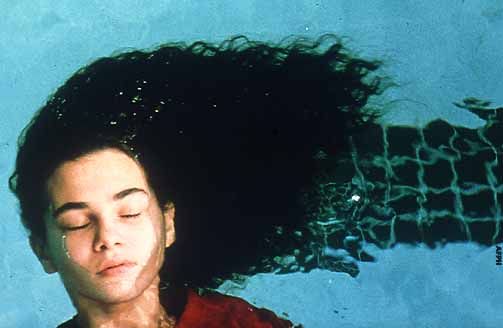Four favourite directors is one of those "post four pictures" memes going around on twitter. As always I've lived in fear of not being chosen (no one thinks I'm a cool cinephile) and of being chosen (everyone will know what a shitty cinephile I am). Thanks to
@jdrrr the former worry is alleviated and I need only grapple with the latter.
In all honesty there's no way I can pick out four directors I currently love because I'm not sufficiently versed in enough directors' oeuvres. There's more than a few of whom I can say that I love every work of theirs that I've seen but "every single work that I've seen" is often 1/3 or less of their output. So I've decided to cheat a little and go with four directors whose work I have been in love with at some point or another.
1. Hirokazu Kore-eda: Baby's First Cinematic Love
Films seen: All his fiction features with the exceptions of
Hana and
Our Little Sister
 |
| Maborosi (1995) |
I saw my very first film by Kore-eda at my very first film festival. I hadn't seen a film that portrayed a foreign nation with a very different material and social culture before and it blew my very suburban, very white mind to see other cultural practices not just as theoretical differences but as lived, taken-for-granted experiences. The film in question was
Still Walking so it also blew my mind to see such a low key and yet deeply moving film. Seeing as I was studying at the time I was able to source most of his films through my university's library and I promptly did so. I especially fell in love with
After Life which I watched from a VCD (remember those?) on a laptop. Its portrayal of the afterlife as both stiffly bureaucratic and unabashedly romantic has stayed with me more than anything else Kore-eda's done. I also read more than a few interviews with him and in doing so learned a little about the history of Japanese film: Interviewers almost always quizzed him about Ozu and he almost always responded by acknowledging a debt to Naruse.
***
2. Carl Theodor Dreyer: Baby's First Religiously Attended Retro
Films seen: Everything, shorts included, except for
The Parson's Widow.
 |
| Day of Wrath (1943) |
As a terrible cinephile it's only natural that I viewed silent films somewhat suspiciously - sight unseen - for the usual nonsensical reasons (too silly, "bad" acting, too simple and so on). However when a full Dreyer retro came to town I had no choice but to attend. For one thing there would be live accompaniment, for another everyone insisted that
The Passion of Joan of Arc was one of the greatest films ever, no qualifications necessary. So yes, I went and yes, I fell in love. The films I most enjoyed were his passionate dramas about religion and/or morality like
Joan of Arc, The President, Ordet and
Day of Wrath. Perversely it was these films that finally gave me the courage, after at least two years of disbelief, to finally tell my religious parents that I was an atheist and would no longer be attending church or leading youth group.
***
3. Andrei Tarkovsky: Baby's First Use of Film to Fill a Hole in His Life
Films seen:
Ivan's Childhood, Andrei Rublev, Solaris, Stalker, Nostalgia.
 |
| Solaris (1972) |
Seeing as I was no longer attending church and
- being an asocial hermit crab - had nothing much else to do I started watching films on Sunday mornings. For the first few months I ended up diving into Tarkovsky. It was more by accident than by design but I quickly realised just how appropriate his films were. In particular
Solaris - in which humans go out among the stars ostensibly to search for something different to or bigger than themselves but in fact to find yet another mirror - struck a chord with me.
***
4. Claire Denis: Baby's First Director Loved From Afar
Films seen: Her fiction features with the exception of
I Can't Sleep, plus
US Go Home and
The Hoop Skirt.
 |
| Nenette and Boni (1996) |
I was theoretically studying history and social science at uni but that didn't stop me from reading film studies books when I was supposed to be researching Zapatistas. It was when reading a book of director interviews that I first came across Claire Denis and learned of her radical take on
Billy Budd. For some time
Beau Travail - and her films in general - were my cinematic white whale. I nearly rent my garments when I realised that I had turned down the chance to see a Denis film at a festival because it (
35 Shots of Rum) had been programmed in the YA section. Fortunately I soon got a chance to see one of hers when
White Material played in my city and I caught up with others on SBS or through DVD. However I didn't fall in love until I caught attended a near complete retro of her work while completing a teaching prac. I would stagger into the art gallery every
vendredi soir, dead on my feat but eager to prop my eyes open in order to catch Denis' seductive, sensual films. Fittingly none of her films proved to be more alluring than
Beau Travail which, despite five years of being an unattainable object of desire, did not disappoint
.



